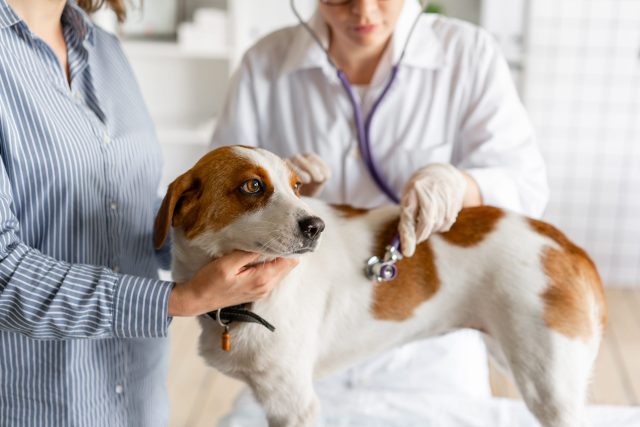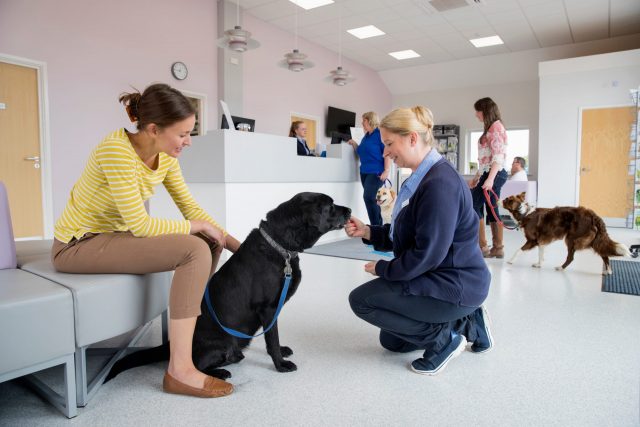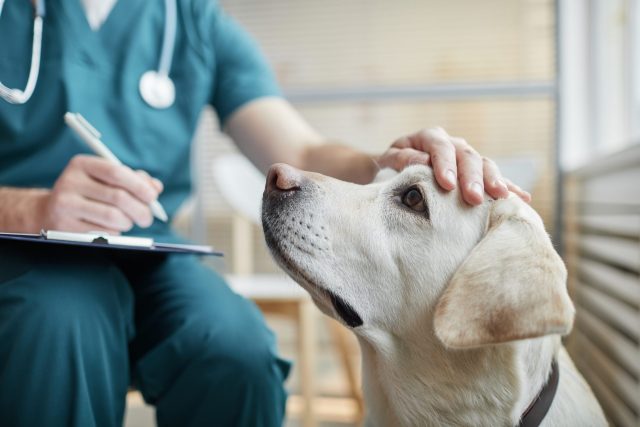Is your dog scared of the veterinarian’s office? Is every trip to the doctor filled with stress for your pup that becomes stress for you too? Imagine a visit to the clinic that comes without worry! Let Steffi Trott of Spirit Dog Training explain how to help a visit to the vet become a fear-free event.
Fear of The Vet – A Common Occurrence
The other day I was at the vet with my dog, Fusion, for some routine blood work. While waiting to be called into a room, I thought of the many dog parents who have written to me asking about working with dogs who are fearful at the vet. As it’s a topic so many dog people experience, I had to address it, and I hope this advice helps those of you whose dogs are scared about going to the doctor!
How To Reduce Fear at The Vet’s Office
#1 – Counterconditioning
Counterconditioning/desensitization is the textbook approach to working with fearful and reactive dogs. If you’ve worked through SpiritDog’s reactivity online course, you already know exactly what this approach entails!
In counterconditioning/desensitization, we expose dogs to their stressor in low intensities and make these experiences pleasant (typically by pairing them with food). If a dog were scared of people, for example, we would have the dog watch people from afar and feed them treats to create new, positive associations.
This approach requires a decent amount of sessions in which the intensity of the stressor is based on the dog’s response. The problem with using it for vet visits is that parents must visit the vet frequently for a while. For the first 5-10 sessions, this might only mean training in the parking lot. The next handful of sessions may require training near the entrance door, and so on. The intensity of the stress can only be increased incrementally throughout these training sessions.
Depending on the dog’s level of fear, counterconditioning/desensitization could require several months of visiting the vet’s office. If it’s possible to visit the vet for training purposes that often, go for it, as this can be the gold star solution for helping diminish fear at the vet.
#2 – Plan Ahead and Be Proactive
Make every single vet visit less stressful by planning ahead.
For many dogs, sitting in the general waiting area is quite uncomfortable. And soon, they’ll associate being in the waiting room with nervousness and worries.
Add the fact that other pets in the waiting area may be whining, crying, and nervous. Still, the stress grows as people come and go, phones ring, and voices sound from the back. The waiting room is really distressing for our dogs!
I highly recommend checking with your vet’s office to see if it’s okay to wait in your car instead and have them call you when it’s your dog’s turn to enter a room. Then you can go straight from your car to the exam room without any of the waiting room stress.
I did this myself recently for my dog Shine. He had received stem cell treatment for a tendon tear in his foot and needed to keep it still. When we went to the specialist for a follow-up, I called ahead of time and told them I was worried he would be too excited in the waiting area. They were extremely understanding. We could wait in our car in the parking lot, and when it was our turn, they even allowed him to come in through a back door so he wouldn’t move too much.
Before your next vet visit:
- Call a day before your appointment, and ask if you can wait in your car.
- On the day of the appointment, check in via phone or by going inside, then stay with your dog in the car.
- Have the office call you when it’s time to go into the exam room.
This will already greatly reduce your dog’s stress!
#3 – Pre-Medicating for Very Stressed Dogs
Some dogs are highly anxious, and vet visits are incredibly stressful for them. This can also happen over time if your dog has gone through significant medical issues in the past and associates the vet’s office with a lot of discomfort.
In these cases, I recommend talking to your vet about pre-medicating your dog before an appointment. It helps them be calmer when severe anxiety comes into play. While medication should never be the sole approach to working with difficult behaviors, it can be a tool in the toolbox that will help our dogs feel better.
Ask your vet if pre-medicating could be an option for your dog if they’re severely stressed during visits. It may just make exams easier for everyone!

Has your dog ever struggled with vet visits? Give these tips a try, and let us know how it goes. And for more great training information, check out Spirit Dog’s online training courses.



 Toledo, United States.
Toledo, United States.